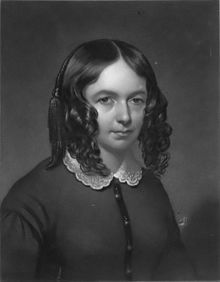Lord Walter's Wife
I
'But where do you go?' said the lady, while both sat under the yew,
And her eyes were alive in their depth, as the kraken beneath the sea-blue.
II
'Because I fear you,' he answered;—'because you are far too fair,
And able to strangle my soul in a mesh of your golfd-coloured hair.'
III
'Oh that,' she said, 'is no reason! Such knots are quickly undone,
And too much beauty, I reckon, is nothing but too much sun.'
IV
'Yet farewell so,' he answered; —'the sunstroke's fatal at times.
I value your husband, Lord Walter, whose gallop rings still from the limes.
V
'Oh that,' she said, 'is no reason. You smell a rose through a fence:
If two should smell it what matter? who grumbles, and where's the pretense?
VI
'But I,' he replied, 'have promised another, when love was free,
To love her alone, alone, who alone from afar loves me.'
VII
'Why, that,' she said, 'is no reason. Love's always free I am told.
Will you vow to be safe from the headache on Tuesday, and think it will hold?
VIII
'But you,' he replied, 'have a daughter, a young child, who was laid
In your lap to be pure; so I leave you: the angels would make me afraid."
IX
'Oh that,' she said, 'is no reason. The angels keep out of the way;
And Dora, the child, observes nothing, although you should please me and stay.'
X
At which he rose up in his anger,—'Why now, you no longer are fair!
Why, now, you no longer are fatal, but ugly and hateful, I swear.'
XI
At which she laughed out in her scorn: 'These men! Oh these men overnice,
Who are shocked if a colour not virtuous is frankly put on by a vice.'
XII
Her eyes blazed upon him—'And you! You bring us your vices so near
That we smell them! You think in our presence a thought 'twould defame us to hear!
XIII
'What reason had you, and what right,—I appel to your soul from my life,—
To find me so fair as a woman? Why, sir, I am pure, and a wife.
XIV
'Is the day-star too fair up above you? It burns you not. Dare you imply
I brushed you more close than the star does, when Walter had set me as high?
XV
'If a man finds a woman too fair, he means simply adapted too much
To use unlawful and fatal. The praise! —shall I thank you for such?
XVI
'Too fair?—not unless you misuse us! and surely if, once in a while,
You attain to it, straightaway you call us no longer too fair, but too vile.
XVII
'A moment,—I pray your attention!—I have a poor word in my head
I must utter, though womanly custom would set it down better unsaid.
XVIII
'You grew, sir, pale to impertinence, once when I showed you a ring.
You kissed my fan when I dropped it. No matter! I've broken the thing.
XIX
'You did me the honour, perhaps, to be moved at my side now and then
In the senses—a vice, I have heard, which is common to beasts and some men.
XX
'Love's a virtue for heroes!—as white as the snow on high hills,
And immortal as every great soul is that struggles, endures, and fulfils.
XXI
'I love my Walter profoundly,—you, Maude, though you faltered a week,
For the sake of . . . what is it—an eyebrow? or, less still, a mole on the cheek?
XXII
'And since, when all's said, you're too noble to stoop to the frivolous cant
About crimes irresistable, virtues that swindle, betray and supplant.
XXIII
'I determined to prove to yourself that, whate'er you might dream or avow
By illusion, you wanted precisely no more of me than you have now.
XXIV
'There! Look me full in the face!—in the face. Understand, if you can,
That the eyes of such women as I am are clean as the palm of a man.
XXV
'Drop his hand, you insult him. Avoid us for fear we should cost you a scar—
You take us for harlots, I tell you, and not for the women we are.
XXVI
'You wronged me: but then I considered . . . there's Walter! And so at the end
I vowed that he should not be mulcted, by me, in the hand of a friend.
XXVII
'Have I hurt you indeed? We are quits then. Nay, friend of my Walter, be mine!
Come, Dora, my darling, my angel, and help me to ask him to dine.'
